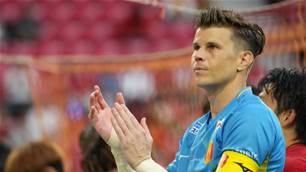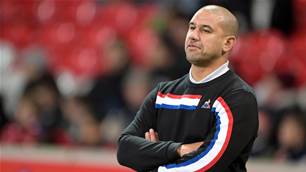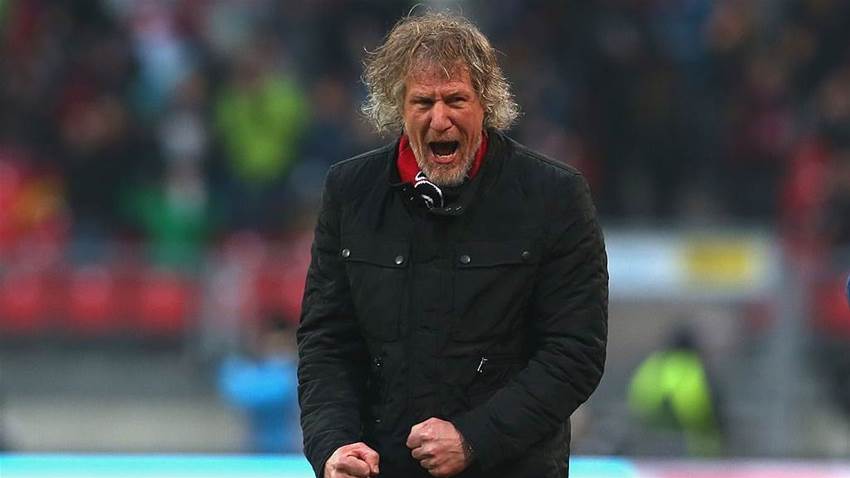Gertjan Verbeek is, in many ways, your usual Dutch coach. But as Australia have learnt all too well over the years, that's anything but predictable.
Verbeek's more than just a grumpy, dishevelled-looking football coach. He's a former semi-pro boxer, a judo sensei, a poet, a carpenter who built his own house and an uncelebrated former Eredivisie defender who, at one stage, was scoring a goal every three games (during the 90s, too).
Most of all he's a windswept optimist with an interest in Buddhism who, despite a challenging, unconventional methodology, has a record of deeply caring for his players - going as far as to adopt a Dutch youth player when his family were unable to care for him.
Sometimes, as it did at Feyenoord, this unique approach comes back to bite him. Other times, it produces truly sensational results.
The City of Churches can look towards a man who nurtured Klass Jan Huntelaar, Daniel Pranjic, Giorgino Wijnaldum, Leroy Fer, Jozy Altidore, Maarten Martens and Brett Holman among others.
He's renowned for his perfectionism, drawing the ire of his subjects for constant nitpicking, while commanding absolute authority.
The swift and sad end to his Feyenoord career all but confirms this.
When Verbeek joined the Dutch giants, straight from Herenveen where he had undoubted control, he joined a club mired in financial strife, straddling a gulf between prodigious youth and experienced veterans with overbearing owners breathing down his neck.
But while Verbeek's results were ordinary, it was an extraordinary loss of respect from his players that led to his sacking.
Verbeek's frustrating approach grated on the side and he was seen as an impractical extension of his predecessor, Bert van Marwijk. But furthermore than his tactics, his personality was reportedly "mercilessly ridiculed".
In his final month at Feyenoord, the Dutchman was oblivious to the fact he was routinely ignored, laughed at and given offensive nicknames by his own players. When he was blanked by the entire squad at one training session, he polled the players' support for him and received a 100% vote of no confidence.
It was to be the first in a series of similar player fallouts.
Always the believer, Verbeek appears calm and introspective after each obscure sacking. "I was communicated with very openly and with integrity," Verbeek said after his Feyenoord departure.
"But unfortunately the same can't be said for my squad. Which is a shame, because they've sold themselves short."

For their part, as more sordid details of Feyenoord's culture slowly seeped out, Dutch fans and the media largely backed the effervescent coach. His press conferences have become a sort-of legend, praised for transgressing into 'theatre', while on the pitch, Verbeek quickly restored his reputation.
He again became intertwined with van Marwijk - a contemporary who Verbeek has followed throughout his career from the Netherlands to Germany and now Australia - in his subsequent spell at Alkmaar.
The northern Dutch town, famed for its cheese markets, provided the most tranquil and successful period of Verbeek's career for nearly three years.
Two fourth-placed finishes, a Dutch Cup triumph, a Europa League quarterfinal and a fantastic record against the 'Big Three' cemented Verbeek's minor-celebrity status in the Netherlands, as he became an Eredivisie cult figure many compared to Louis van Gaal.
He again proved an undying loyalty to his players in December 2011, when Alkmaar goalkeeper Esteban Alvarado was sent off in a match against Ajax for kicking a pitch invader.
Verbeek promptly stopped play and withdrew his entire side from the game, cancelling the match in solidarity. The KNVB eventually rescinded the red card, re-staged the match and AZ won 3-2.
But once again, Verbeek's strenuous relationship with his players came back to haunt him.
"Coach Gertjan Verbeek leaves AZ with immediate effect," the club's 2014 statement bluntly read, three days after Verbeek's low-budget side had cooly dispatched the league champions.
"Based on a lack of chemistry between players and the head coach resulting in a lack of confidence, the management and supervisory board sees no more basis for further co-operation."
While to Verbeek, his sacking once again came as "a bolt from the blue", once again his players had previously announced they'd lost faith in his management.
At Feyenoord, it could have been expected: a difficult, eccentric coach with little first-tier experience taking over a squad brimming with egos.
But at Alkmaar, a team that four years earlier had been nearing administration, with a history of eccentric coaches, which was lavishing in one of the greatest periods in its history... it was gobsmacking.
Related Articles
.jpeg&h=172&w=306&c=1&s=1)
Socceroos prodigy returns to A-League after horror run

Star keeper's exit heralds hero's return at A-League giant













